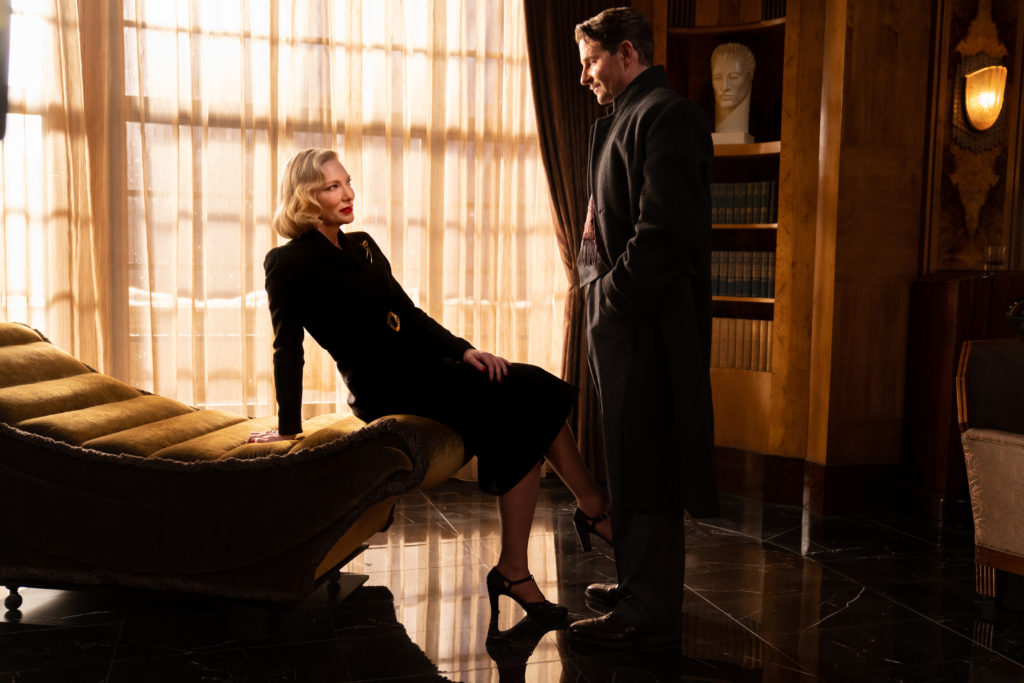Reviews include 40 Acres, Jurassic World: Rebirth, and Sorry, Baby.
TFCA Friday: Week of Dec. 17
December 17, 2021

Welcome to TFCA Friday, a weekly round-up of film reviews and articles by TFCA members.
In Release this Week
Being the Ricardos (dir. Aaron Sorkin; Dec. 21)
“If you’re still ticked that Debra Messing was passed over to play Lucille Ball in Aaron Sorkin’s Being the Ricardos, as I was, you can relax,” advises Anne Brodie at What She Said. “Nicole Kidman goes for broke, stepping way out of her fragile flower persona to play the brassy, ballsy, opinionated and savvy actor/businesswoman and succeeds.”
“Sorkin stages a solid climax that proves that the power couple is more intelligent and talented than the couple they portray in the series,” notes Gilbert Seah at Afro Toronto.
“The key problem with Being the Ricardos is that neither Kidman nor Sorkin is particularly good at switching from the drama, which plays out reasonably well, to the comedy that is at the core of Ball’s art,” admits Marc Glassman at Classical FM. “Quite simply, Kidman isn’t funny, and neither is Sorkin.”
Flee (dir. Jonas Poher Rasmussen)
Calling it “the best film of the year,” Pat Mullen at POV Magazine speaks with director Jonas Poher Rasmussen about crafting his friend’s story through animation. “Flee is Amin’s story seen through my lens. Someone else could tell it another way. Someone else who experienced Amin’s story could tell it in a way other than Amin would tell it,” says Rasmussen. “Sometimes finding these tools can really crack open a story in a way that’s really beneficial, not only for the filmmaker and audience, but also for the subject of the film.”
“Amin’s story is heart-felt and horrifying,” observes Marc Glassman at Classical FM. “How many other families from Syria, Afghanistan, Lebanon and too many countries to name are in the same position as Amin’s family was—or worse? Flee is an eye-catching story, beautifully made, with a tale that all of us should take to heart in an age of refugees and homeless people.”
“Flee will change the way you think about refugees and underserved peoples of the world in deeper, richer ways,” notes Anne Brodie at What She Said. “This mindboggling, extremely powerful film asks the question ‘what is home’ and for many in the world, there is no answer.”
“There’s a line from his story that stuck with me. ‘Most people can’t even begin to imagine how fleeing like that affects you … how much it destroys you.’ I certainly can’t,” writes Chris Knight at the National Post. “But like all great documentaries, Rasmussen’s framing of Amin’s story goes a long way to bridging that gap.”
“Rasmussen tells the story so that we understand what Nawabi has been through without sensationalizing,” observes Karen Gordon at Original Cin. “As you’d imagine, it is a story that is at times harrowing and at other times frustrating. For much of it, the family is stuck in the tedium of endless waiting for positive movement that will allow them to be recognized as citizens. And yet the strength of family holds them together.”
“Mixing archive footage, animation and interviews of Amin, the main character, animated style, Flee, a heartbreaking film about a family’s survival breaks ground in storytelling making the film an ideal candidate for Best Animated Feature of the year,” says Gilbert Seah at Afro Toronto.
At The Globe and Mail, Barry Hertz speaks with Rasmussen about preserving his friend’s identity while bringing the tale to audiences worldwide. “I think that he’s very happy to be anonymous still, especially now that the film is being released. It is a little overwhelming for me, but especially him. But because we’ve known each other for so many years, he trusts me,” says Rasmussen.
In Balanchine’s Classroom (dir. Connie Hochmann)
“While the archive often illuminates the laudatory interviews, it inevitably has a certainly flatness that leaves something to be desired,” admits Pat Mullen at POV Magazine. “Live performances can translate relatively well if the camera is as dynamic as the dancers are, but these videos are mostly records.”
The Lost Daughter (dir. Maggie Gyllenhaal)
“The Lost Daughter marks Maggie Gyllenhaal’s directorial debut and she’s a careful interpreter of Elena Ferrante’s novel and creates tension so thick you could use it for sunscreen,” writes Anne Brodie at What She Said. “We know what’s going on but how did it happen?”
“The Lost Daughter, based on a 2006 novel by Elena Ferrante, and a writing/directing debut for actress Maggie Gyllenhaal, is a fascinating examination of motherhood and the presumed selflessness of those who engage in it,” notes Chris Knight at the National Post.
Margrete: Queen of the North (dir. Charlotte Sieling; Dec. 22)
“The multitalented Danish actor Trine Dyrholm is mesmerizing; as a child, her character witnessed the brutal carnage of war, sparking her dedication to creating peace,” says Anne Brodie at What She Said. “She married for love and adopted a son, Prince Erik and there was peace in the region for the first time in centuries.”
At Afro Toronto, Gilbert Seah calls it “royal drama at its best.”
Nightmare Alley (dir. Guillermo del Toro)
“[W]hile Stan merrily goes to hell, del Toro revels in the exquisitely manicured world he’s constructed for him, showcasing both his cast and his production team with every frame,” says Norm Wilner at NOW Toronto. “Splendid and seamy, the film’s intentions keep slipping out of our grip even as its tone remains precisely controlled. To quote a slogan splashed across the circus geek’s tent, Nightmare Alley is neither man nor beast, but it understands perfectly well how one becomes the other.”
“Noir is a perfect genre for del Toro,” notes Marc Glassman at Classical FM. “He’s a true cinema nerd who has the talent to replicate the best of a stylish form that hit its peak in the late ‘40s when returning war veterans and wised-up civilians responded viscerally to dark portraits of people haunted by the past, struggling against forces—corrupt rich men, femme fatales, a system they hated—which would excite and then destroy them.”
“[A] lengthy 2 and a half hours takes it time to unfold,” admits Gilbert Seah at Afro Toronto. “But there is much to appreciate in terms of the creation of atmosphere and mood and performances in the meantime.”
“The effect is often mesmerizing; inky darkness punctuated by blinding colour, snowy exteriors, those before-mentioned interiors. The whole thing looks beautiful, and persuasively foreboding,” notes Kim Hughes at Original Cin. “But two-and-a-half hours of skullduggery powered by wholly disagreeable characters is a lot to bear even as the senses are dazzled. As a fan of del Toro, I desperately wanted to love this movie. I watched it twice. But it just didn’t connect.”
“Mara’s character might be the nearest thing to pure virtue in a story where everyone has at best a tenuous grasp on morality, and a propensity to use people as means to their own ends,” writes Chris Knight at the National Post. “And there’s an underlying theme about people’s desire to have their secrets found out, if only to be seen for who they truly are. But beware: visibility breeds vulnerability.”
“Nightmare Alley might only truly, completely, deeply click for a moviegoer who is as studious and fanatical as del Toro,” says Barry Hertz at The Globe and Mail. “This is noir crossed with American realism that also paradoxically flirts with cosmic absurdity.” Hertz also speaks with del Toro about shooting the his favourite city: Toronto! “Some of the stuff that we did changes everything,” says del Toro. “Some locations, we flipped the film. Left is right, right is left. In other circumstances, we replaced the skies, erased the horizons. We went to locations and added architecture, full buildings right in the background.”
“Every good noir defines itself with the calibre of its femme fatale, and Nightmare Alley gives us one worthy of the bars set by Rita Hayworth and Barbara Stanwyck. Blanchett relishes the part and is at her beguiling best while drawing upon the iconography of classic bad blondes,” writes Pat Mullen at That Shelf.
The Novice (dir. Lauren Hadaway)
“Hadaway’s character study looks at cruelty, singleminded aspiration and the healing hope of finding balance. A knockout,” raves Anne Brodie at What She Said.
The Pit (dir. Dace Pace)
“The Pit is one of the best psychological horror coming-of-age films seen and not surprisingly is the country, Latvia’s entry for this year’s Academy Awards,” notes Gilbert Seah at Afro Toronto. “And it is one of the Best International Features (next to France’s Titane) to emerge this year.”
Red Rocket (dir. Sean Baker)
“Baker has pitched this as a dark comedy. And thanks to the relentless energy of Simon Rex, the film feels like a comedy. Rex who is down to almost nothing, is fighting for his life, but he’s also a user and a manipulator,” says Karen Gordon at Original Cin.
“Whatever you think of Baker’s world, though, Red Rocket is mostly Rex’s show. The former MTV personality, whose biggest onscreen acting credits involve the lesser editions of the Scary Movie franchise, is in nearly every scene here, tasked with being the story’s hero and villain. There is a certain X-rated energy to him, but to keep things clean we can just say the actor controls the camera with a massive kind of swagger. Hello, hello, hello,” raves Barry Hertz at The Globe and Mail. Hertz also speaks with Rex about his “adults only” comeback.
“Baker, working with his frequent co-writer Chris Bergoch, has a knack for dialogue – ‘The yard’s a mess – ooh a dragonfly!’ speaks volume about Mikey’s priorities and attention span. And the director has a real eye for portraying America’s dusty, unexamined corners,” observes Chris Knight at National Post.
“Director Baker achieves the near impossible, making a ‘sort-of’ charming feel bad movie about a loser,” says Gilbert Seah at Afro Toronto.
The Scary of the Sixty-First (dir. Dasha Nekrasova)
“Nekrasova makes no compromise in her depiction of the horror that comes. And she really knows how to dish the horror out,” writes Gilbert Seah at Afro Toronto.
“Dasha Nekrasova’s bored gamine onscreen presence is quite funny (she suggests a jaded Emma Watson). But much of the acting here is atrocious and the slash-and-splatter ending disappointingly conventional,” notes Liam Lacey at Original Cin. “When the moment finally comes to make a tasty meal of the rich, the recipe will need to be planned more carefully than this.”
Schemes in Antiques (dir. Derek Kwok)
“Schemes in Antiques is all over the place, but this one has fewer fight action scenes (than the typical HK action flick) but with more distractions such as how to tell a fake from a genuine antique,” notes Gilbert Seah at Afro Toronto.
Spider-Man: No Way Home (dir. Jon Watts)
“Like those wrestlers who would work up the crowd by flaunting their own presence, No Way Home is satisfied with itself for just daring to resurrect dated contracts and negotiate new terms to bring all these old players into the MCU ring,” sighs Radheyan Simonpillai at NOW Toronto. “The whole multiverse thing with its alternative dimensions and timelines – which were so brilliantly and joyously plundered in Spider-Man: Into the Spider-Verse – is becoming the Marvel Studios strategy to reset and renew our subscriptions to the brand.”
“Spider-Man: No Way Home is a comfort-food present to long-time fans, like a cross-over episode of one or more beloved TV series, with winks, call-backs, trivia, cameos, super-villains and copious destruction,” writes Jim Slotek at Original Cin. “Perhaps the only other super-hero franchise that could pull off something similar would be the Batman/Dark Knight movies.”
“Spider-Man: No Way Home is both a gigantic act of franchise-mad hubris, and a ridiculous amount of fun,” writes Barry Hertz at The Globe and Mail while navigating fickle spoiler caveats. “It was like sensory-overload therapy, courtesy of our gracious corporate cinema overlords.”
“No Way Home is the third collaboration among writers Chris McKenna and Erik Sommers and director Jon Watts, and it’s always nice to see that kind of continuity in a trilogy,” says Chris Knight at the National Post. “They do an admirable job of juggling a large number of characters, though this is a movie that could stand to drop a ball or two in the name of a slightly shorter runtime…No Way Home is also the weakest of the trilogy when it comes to balancing goofiness and gravitas.”
“Spider-Man No Way Home is a top-tier MCU film that’s in the conversation with Into the Spider-Verse for best Spider-Man movie,” writes Victor Stiff at Victor Stiff Reviews. “No Way Home beautifully captures the essence of the character while serving up mind-melting action and wrenching emotional beats.”
“[T]his Spider-Man entry is mostly super special effects that move along at such a breakneck speed that one can hardly distinguish what is going on, resulting in a complete mess of a blockbuster,” groans Gilbert Seah at Afro Toronto.
2021 in Review
At RogerEbert.com, Jason Gorber offers his picks for the best films of 2021 and expands upon them at That Shelf. Here’s his take on film #1, Summer of Soul: “It’s not often that a film can literally reshape history, but Ahmir “Questlove” Thompson’s ecstatic film does just that. Drawn from footage that sat on a shelf for decades, combined with contemporary interviews and precise and rhythmic editing style befitting the celebrated drummer, this is the most musical of musical films, the most profound of documentaries, and the most fun to be had revisiting a hot 1969 summer, where the crowds gathered and were wowed by a concert event for the ages.”
At NOW Toronto, Norm Wilner delivers his top ten of 2021. Atop the list: Johanna Hogg’s The Souvenir: Part II. “No other film moved me as much as Hogg’s follow-up to her autobiographical 2019 drama about a film student discovering her artistic perspective by surviving a toxic relationship,” writes Wilner. “Part II finds Honor Swinton-Byrne’s Julie trying to turn the experience into art, and Hogg finds both the anxious tension in the work and the unexpected laughter that comes from the release of that tension. Personal, powerful, perfect.”
The NOW Team celebrates local heroes and salutes the Toronto talents who championed change in 2021. On the list? TIFF’s Cameron Bailey, Reel Asian’s Deanna Wong, filmmakers Danis Goulet and Jennifer Holness, and more!
Speaking of local heroes, Radheyan Simonpillai profiles One of Ours director Yasmine Mathurin at NOW Toronto and unpacks the elements of representation and belonging that make her debut a standout. “Finding a sense of belonging has been tricky for Mathurin, who spent much of her childhood moving back and forth between Haiti and Montreal, before moving to Calgary during her teen years, and Toronto as a young adult,” writes Simonpillai. “A temporariness always hung over wherever she was, complicating the idea of home. And that in turn affects how she sees her identity, since she’s shifting between locations where interacting with one’s own Blackness is fluid and at times tricky.”
At The Globe and Mail, Barry Hertz offers his top ten films of 2021. The top slice: Licorice Pizza. “Ignore the unappetizing title and concentrate on what a delightful cinematic gift Paul Thomas Anderson has given us this holiday season. It is difficult to know where to start in praising this coming-of-age romantic comedy…It all clicks. Even the title.” Hertz also picks the most overlooked, underrated, and/or ignored movies of the year. Atop that list? The Last Duel. “Ignored by audiences and mis-marketed by its studio, Ridley Scott’s medieval spin on Rashômon will go down as one of 2021′s most epic surprises,” writes Hertz. “With Scott’s A-level craftsmanship, an ambitious script by Matt Damon, Ben Affleck and Nicole Holofcener, and excellent lead performances across the board – especially a steely Jodie Comer and a sly Affleck – The Last Duel is a welcome reminder of what Hollywood titans can do when they’re not squeezed into the confines of a superhero film.”
https://youtu.be/RaAG-SwEa7k
TV Talk: Station 11 and SATC
At What She Said, Anne Brodie finds the pandemic-set series Station 11 chillingly of the moment. “Multiple timelines and stories overlap, creating great tension and excitement as threads uniting them become clear. The series spans 15 years, the characters’ lives and fortunes are irretrievably affected by the pandemic and some don’t make it,” she writes. As an alternative, there’s Prince Phillip: The Royal Family Remembers. “[A] great collection of archival footage make this a must-see for Royal watchers,” notes Brodie.
At NOW Toronto, Glenn Sumi checks out Sex and the City sequel And Just Like That. And he does not like what he sees. “Many of the show’s characters talk about feeling tired. Obviously the creative team felt the same way. After all, when you have hired legendary actors like Brenda Vaccaro and James Naughton – not to mention SATC regulars like David Eigenberg and Evan Handler – and give them nothing to do, you know you’re in trouble,” writes Sumi. “This series is in trouble. I’ll still watch every episode, for old time’s sake, even though just like that, my fond memories of SATC are slowly being destroyed.”
At The Globe and Mail, Barry Hertz speaks with Station 11’s Mackenzie Davis about the weird circumstances of making a pandemic show amid a pandemic. “It’s echoed in the show, this testament to the fortitude of artists who want to make something,” says Davis. “And, also like on the show, it became this cathartic space for this shapeless trauma that we’ve all gone through. The reason these characters perform Shakespeare 20 years after a pandemic is that it has to give them something as well. It’s a sort of therapy.”



